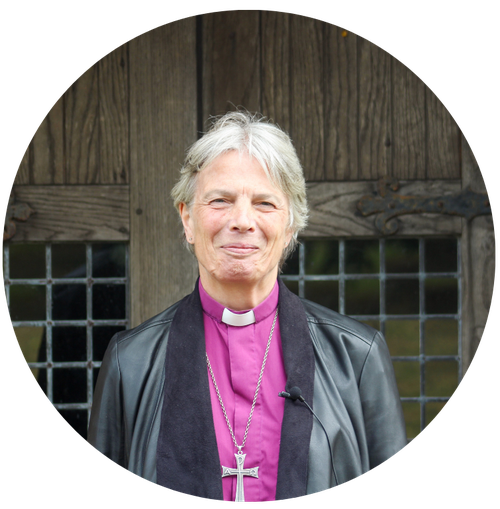Archbishop of Wales speaks of a 'faithful, hopeful and fruitful future' for Bangor Diocese

The Archbishop of Wales has spoken of a "faithful, hopeful and fruitful future" for the Diocese of Bangor
Archbishop Cherry Vann addressed the Bangor Diocesan Conference over the weekend, acknowledging the complex challenges facing the diocese whilst striking an optimistic tone about the path ahead.
Speaking to clergy and lay members, Archbishop Vann drew parallels with her experience in the Diocese of Monmouth, where she arrived in 2020 to find a community dealing with trauma and divided loyalties.
"The challenges are complex, deep-seated and long-standing and they will take a long time to unravel and deal with appropriately," she told the conference. "But it will require everybody pulling together."
Using the biblical metaphor of pruning vines to encourage growth, Archbishop Vann spoke about the need for renewal even when it feels uncomfortable. She encouraged the diocese to focus on its spiritual roots during this season of change, comparing the church's journey to the natural cycles of growth, dormancy and renewal seen in the seasons.
"Fruitfulness in its most visible sense is not a permanent feature in the natural world and we shouldn't expect it to be so in the church," the Archbishop said, before asking members to consider what "season" their own churches and communities were experiencing.
Archbishop Vann assured the conference of her continued prayers as the diocese works together towards recovery and renewal.
Presidential Address

By the Archbishop of Wales Cherry Vann.
I am grateful for this opportunity to be with you in person and to address you as part of this diocesan conference. This is not what any of us was expecting, even 6 months ago and I want to assure you above all else of my prayers as together we seek to address the challenges that lie before us.
As I said in my address to the Governing Body, I want to pay tribute to Bishop Andy in his role as Archbishop and for the way in which he held the space for the Bench to work more effectively and in a much more open, honest and increasingly transparent way. I know that he and Naomi are very much in your prayers and they are in mine too. As is Bishop David as he discerns where God is calling him to serve next.
Keeping our eyes fixed on Jesus
When I arrived in the Diocese of Monmouth back in early 2020, the diocese was in trauma. It was a different trauma to the one that you are facing here in Bangor, but it was a trauma nonetheless. The bishop had stood back from ministry in July 2018 for reasons no-one knew, apart from three of his senior colleagues, and he was off for a year before eventually retiring. The vast majority of people had little or no idea what had actually happened in that year, nor did they know why. Some speculated, and rumours abounded. Some were angry, others saddened, others still, indifferent.
But what they were left with was a diocese with divided loyalties and a deep-seated lack of trust, between themselves, between churches and the senior team, between clergy and the Bench and RB. What I found, and what we uncovered together were elements of a trauma that were much more deep-seated than simply the disappearance of their bishop 18 months previously.
Similarly, what we are discovering here are things that go back far beyond the last 18 months or so. The challenges are complex, deep-seated and long-standing and they will take a long time to unravel and deal with appropriately. I ask for your prayers for those who are and will be at the forefront of that work. But it will require everybody pulling together and all of us, first and foremost, keeping our eyes fixed on Jesus who is the founder and perfecter of our faith. Whilst, of course, being mindful of the challenges that need to be addressed.
God longs for us to be fruitful
I’m grateful to Canon Miriam for choosing the passage she has for this morning’s reflection and for focussing particularly on the theme of being fruitful even in painful and challenging circumstances, which feels particularly apt. God longs for us to be fruitful. And in order to be fruitful we need the right conditions.
Jesus talks about pruning in a positive sense. Yes, it means cutting out what’s weak and what’s diseased, trimming back in order to encourage healthy growth in the next season, sometimes taking things down to a few healthy shoots that show promise and vigour. It’s easy talking about pruning when it comes to plants and bushes. It’s much harder when we apply it to ourselves, our lives, our preferences, our prejudices. It can feel like losing what we’re comfortable with, being parted from what is familiar, being stripped of attitudes and behaviours that we were unaware of, or thought were OK but which we come to see as patronising, arrogant, bullying or simply wrong. ‘He removes every branch in me that bears no fruit’, Jesus tells us. ‘Every branch that does bear fruit he prunes to make it bear more fruit.’ In other words, being pruned is an essential part of the life of faith – and it can feel costly, painful and exposing.
But essentially, Jesus goes on to say, we can bear no fruit unless we abide in the vine, in Jesus himself. Being fruitful, means being joined to Jesus; connected to him in prayer and worship, alive to his presence with us and around us as we go about our daily lives. It means planting the roots of our hearts and souls deeply into the streams of living water. As the psalmist wrote, those who are blessed are like trees planted by streams of water, which yield their fruit in due season and their leaves do not wither – even in the fiercest drought, the strongest storms, the most challenging of conditions.
A good tree cannot bear bad fruit
That is our calling as disciples of Jesus - whoever we are and wherever in this wonderful diocese God has placed us – to focus on the one who calls us and allow him to feed us and water us and prune us as he wills, that we might flourish and be fruitful, individually and together.
We are rooted and grounded in the loving purposes of God.
A good tree cannot bear bad fruit. We will bear good fruit to the extent that we are rooted and grounded in the loving purposes of God.
But it is, in the end, God who gives the growth and causes us to be fruitful.
And even then, there are times and seasons. Times when things fade and die and decay, as they are doing all around us during this season of autumn. Times when most if not everything is dormant. Nothing seems to be happening. Life and growth are hidden away. Times when the dead and old are cut away and tender shoots emerge, needing care nurture and protection. They’re full of promise and signal new life, and with it, hope. Then there’s summer, when the natural world is in full, fruitful and glorious display.
Our task is to make ourselves available for that life and fruitfulness to flow
What season are you in, I wonder. What season is your church, your MA, your deanery and archdeaconry in. Your diocese. Fruitfulness in its most visible sense is not a permanent feature in the natural world and we shouldn’t expect it to be so in the church. And how we are to tend to ourselves and attend to the life of our church, will depend on what season we each discern ourselves to be in.
In it all, whatever it looks and feels like, God is present and active. Forever leading us into life and showing us bit by bit what life in all its fulness means for us. Our task is to make ourselves available for that life and fruitfulness to flow, fully and abundantly, through us.
Be assured of my prayers as we work together to ensure a faithful, hopeful and fruitful future for this diocese of Bangor.